
GOAL!
11 Films About the Beautiful Game
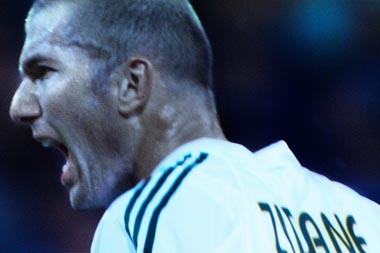
eric pfriender
A few weeks ago, in an email exchange regarding our recent Summer Movie Preview, I somehow got into an argument with the editors of The Pink Smoke about whether or not soccer was a terrible game. Dear reader, you and I both know that not only is soccer not a terrible game and the most poetic of all team sports, but soccer is not even called soccer. It's called football, and it is a thing of beauty. Nothing in this world looks like a wide-open pitch, nothing in this world feels like lacing up your boots on a Saturday morning when the grass is still slick with the morning's dew, and there is not a greater joy in this life than watching someone finish off a well-timed cross. The sound of a ball dragging against the back of the net is a more glorious sound than the complete works of Mozart, the first songs of the first birds of spring, and the tinkle of ice cubes dropped into a rocks glass all rolled together. Dear reader, you and I know all of this. Unfortunately, it seems that the editors of The Pink Smoke do not.
My assignment was clear: there is only one language powerful enough to convince Funderburg and Cribbs of anything. That language is the language of cinema [we also would have accepted the language of food --john]. I would hunt down eleven films about the World's Favorite Game, and I would present them as irrefutable evidence of the glory of football. Unfortunately, I did not know then what I know now - they don't really make good movies about football.
With the World Cup just days away, I didn't have much time to prep my starting eleven. I was going to have to carry some weaker players, and hope the stars could make up for it. Thus, I give you my starting lineup...
My keeper... Victory
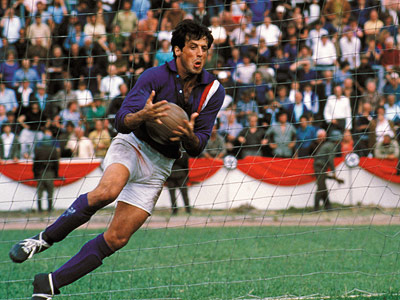
The pitch: In a WWII prison camp, British Officer Michael Caine organizes a team to knock the ball around to keep the boys' minds off their imprisonment. His ragtag team catches the eye of Nazi general Max von Sydow, who proposes a match between the prisoners and the German National Squad. It's a perfect propaganda device for the Nazis, but they don't realize two things: the match is really an elaborate escape plan for the prisoners, and one of the prisoners is played by Pele.
How It Plays: This is the movie everyone thinks of when someone mentions "that movie about soccer." It comes with a pretty killer pedigree: it's directed by John Huston, who is the kind of man they don't build anymore, it's got Pele in it, it features Michael Caine and Max von Sydow, and the goalie is played by Sylvester Stallone. Oh, did I forget to mention that? Well it's true: Rambo is the fucking keeper. On paper, this isn't just the best movie ever made about football, it's the best movie ever made.
How it actually plays is a little weirder. Despite the fact that it would eventually be known as the movie where Rocky plays goalie against the Nazis, it seems that while making it, everyone involved thought they were making a new spin on The Great Escape. It really takes itself seriously as a prison-break film.
The movie opens with a botched escape attempt in which a prisoner is machine-gunned down against a barbed wire fence. Kind of brutally, actually. Stallone's character is an American intelligence agent who is obsessed with escaping the prison. When his latest escape plan is sidelined by the "soccer team escapes from the stadium in Paris at halftime" plan, he decides to join the team, despite the fact that he has no idea how to play the game. During tryouts he runs around like a chicken with its head cut off, talking non-stop about what a great player he is. Eventually he tries to tackle another player, American-football style, and Caine throws him off the team - it's hilarious. He is repositioned as the team's trainer until Caine decides he might be able to play goalie. Later in the film, he gets very neurotic about people teaching him where to stand for a corner.
There's a great moment in the middle of the film where Caine gives the Nazis a list of players he wants rounded up from some of the other "prison camps." Some of them are Polish footballers, and it seems they might not be able to get them because "officially, they do not exist." When the players eventually do show up, it's clear which camps they were being held in. They are all severely underweight, malnourished, and near death. It's pretty upsetting.
The last third or so of the film is dedicated to the final match. The Germans spend the first half kicking the prisoners' asses, but that just sets us up for the finale: because at halftime, the escape plan works! The entire team sneaks from the locker room into the secret tunnel, and is on their way to freedom, until the players, one by one, begin to tell Michael Caine that they believe they can win the game. They collectively decide that instead of following through with their escape plan which has already fucking succeeded, they will go back and beat the Nazis at football. Needless to say, Stallone is beside himself.
Quality of Football on Display: The actors who need to be good all appear to have decent ball handling skills, (including von Sydow, who has a little volley in his SS boots), and the filmmakers drafted a bunch of actual players to fill out the members of the team who don't really have speaking roles. Stallone looks terrible, but he's supposed to be terrible. Pele scores on a bicycle kick. One of the other Brits performs a rainbow over the head of one of the Germans. Overall, fairly impressive.
The Result: It has some absurd moments, and a fair amount of running time is dedicated to breaking out of prison, but a victory nonetheless, one-nil.
My midfield... Rudo y Cursi
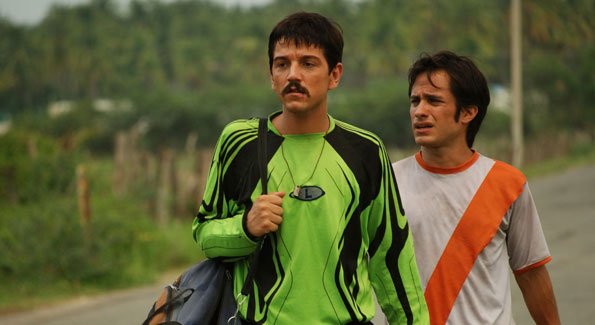
The Pitch: Two dirt-poor brothers who work at a banana farm and live with their large extended family in Mexico are discovered by a talent scout and experience a roller-coaster ride of fame, fortune, and ultimately despair as they become professional football players. The brothers are played by Gael Garcia Bernal and Diego Luna, in their first film together since Y Tu Mama Tambien, and the film is directed by Carlos Cuaron, whose brother directed the earlier film.
How It Plays: Another weird one. The film doesn't take itself too seriously, and it seems like it knows it just wants to have fun, but that sort of works to its detriment. The brothers' road to success is undermined by Bernal's true dream of becoming a pop star and by the fact that Luna is a degenerate gambler. At first, the Bernal-as-pop-star angle is kind of funny, when he actually finds some success with a Spanish language cover version of "I Want You (To Want Me)". Unfortunately, after the initial hilarity of seeing the video for his song, we are then treated to another three or four performances of it. It feels like a good ten percent of the film's running time is dedicated to listening to it. It's a bit much. And Luna's gambling angle feels weirdly shoe-horned in, as if Cuaron was having trouble coming up with a credible reason for the brothers' dreams to come crashing down around them. Still, the two leads have pretty good chemistry, and Guilermo Francella as Batuta the talent scout is laid-back and awesome and brings the film to life whenever he's onscreen.
Quality of Football on Display: What's on screen looks fine, but there is surprisingly little of it. Bernal plays a Striker, and he has exactly one shot where he does some fancy footwork and it looks really impressive. Luna is a keeper. The film has two scenes where the brothers square off on a penalty, but thats about it. Every time the narrative takes us to where a game is taking place, we cut to shots of Batuta watching from the sidelines, or the scoreboard, or the crowd. It feels like the film's budget didn't account for the filming of actual football.
The Result: Technically a victory, but it feels a little like a Division One Team playing a scoreless draw with a Division Two Team straight through both overtime periods, then squeaking out the win on penalties. Technically pleasant, utterly forgettable.
My right wing... Ladybugs
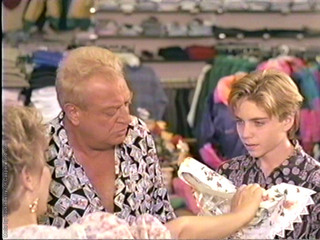
The Pitch: In order to impress his boss and secure a promotion so that he can earn enough money to marry his girlfriend, Rodney Dangerfield agrees to coach the boss' daughter's soccer team, The Ladybugs. There are only two problems: Dangerfield knows nothing about soccer, and the Ladybugs are terrible. Then Rodney comes up with an airtight, sure-fire plan to win: if he can get his girlfriend's son to dress up like a girl and play for the Ladybugs, they'll win the championship for sure! Cross-dressing hilarity ensues.
How it Plays: Worse than it sounds. Is it just me, or is it really fucking weird that there is an entire subgenre of sports movies about people who, in order to achieve some goal or atone for some sin in their adult life, are forced to coach an inept children's sports team? It's like that joke from "Seinfeld" about the show where someone is sentenced by a judge to be someone else's butler, except instead of it just being a joke, they actually made one movie for every sport, and they expect us to watch them.
Ladybugs has the added indignity of presupposing that we agree with it that one bewigged male, despite the fact that he was actually cut from the boys' team, would clearly be better than an entire team of female players. In its defense, it does up the ante on the whole "dude just got hit in the nuts" gag. Because here, nobody else is supposed to know that he has nuts! Get it? Yeah, I didn't either.
Ladybugs also features a scene where Dangerfield is in a dressing room with "Martha" (the late, great Jonathan Brandis), trying to zip up his/her dress. Unbeknownst to them, a woman is waiting with her daughter outside the dressing room, looking at the two pairs of feet on the other side of the curtain and listening to Dangerfield rambling on about "Martha" "not telling your mother" and "it's too tight," then coming out of the dressing room and leaning over to tell the woman's daughter how cute she is. It's even creepier than it sounds, and I thought it was weird that it seemed like a good idea to include in a movie ostensibly for kids. Then I realized that the movie is in fact rated PG-13, which leads to the even weirder question: who is this movie for? It's hard to imagine a couple of adults coming home from watching their kids' shitty soccer team play on a Saturday afternoon, hire a sitter, go out for the night, and then watch Rodney Dangerfield's shitty soccer team for two hours. But due to the unfortunate and misguided sexual innuendoes, kids can't see it either. Clearly this movie was going for the "huge fan of Rodney Dangerfield/gender-confusion-themed pedophilia" demographic.
Quality of Soccer on Display: Pretty terrible. The Ladybugs are supposed to be bad, but the movie goes for incredibly broad humor by having the 'Bugs be so bad that they run off the field with the ball, or constantly kick the ball straight up in the air, or just stand around picking their noses. Brandis joining the team doesn't help anything. Nobody involved in the production cares about the game at all, or knows anything about the sport besides "soccer is something parents in suburban America encourage their kids to play, so we can probably build one of those 'dude is forced to coach a shitty team' movies around it. Throw Dangerfield in there. You know what? Cross-dressing. Throw that in too. Trust me, it's gonna be huge."
The Result: Watching this movie is like being hit in the nuts and not being able to tell anyone about it.
My defender... The Damned United
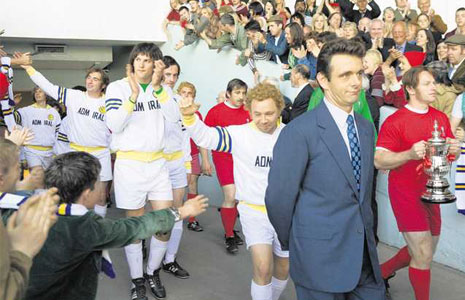
The Pitch: The dude who plays Tony Blair in every movie about Tony Blair plays Brian Clough, in a film depicting the events that led to his ill-fated stint as coach of Leeds United. Written by the guy that wrote all the movies in which he played Tony Blair. Also starring Mike Leigh's supporting cast (you know, the teaching staff of Hogwarts Academy.)
How it Plays: Pretty well, if a little underwhelming. The film is not about the actual game as much as its about the business end of professional football, and the relationship between fans, management, coaches, and owners. Michael Sheen is typically good as Clough, a man whose near-inexplicable hatred of the manager of Leeds United, stemming from a perceived insult, leads to a six year campaign to build up his second division club in order to beat Leeds, which he does, the unforeseen result of which is that he is hired to manage Leeds when Leeds' manager is hired to run the British National Squad. The film is also about Clough's relationship with his coach, played by the great Timothy Spall. I don't have a particularly great knowledge of the history of British football, so the twists and turns of how it all shook out were surprising to me in a way that they probably wouldn't be to an English football fan. Clough had a habit of running his mouth off and being a bit arrogant, which led to comparisons to Muhammad Ali, which actually led Ali to make a remark about him, which is in the film.
Quality of Football on Display: Again, not a lot, but the film obviously knows its football.
The Result: A solid, well-played win. 2-1, with the opponent's goal coming in the 84th minute, with the game all but decided already.
My stopper... Green Street Hooligans
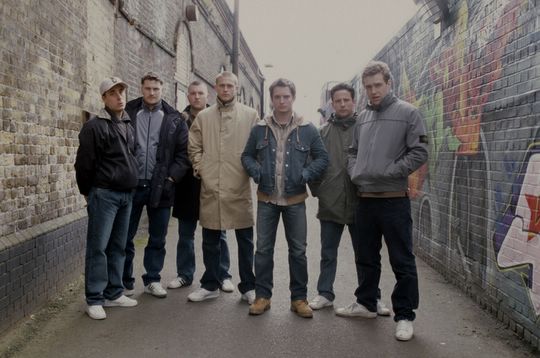
The Pitch: Frodo is accused of a crime he didn't commit (it's like Hitchcock directing Lord of the Rings) and he is forced to leave Harvard. He moves to London to see his sister, and through his brother-in-law's younger brother, gets introduced to the exciting world of soccer hooliganism. Over the course of the film, Frodo learns several dubious lessons about honor, loyalty, and revenge.
How it Plays: Not well. One of the movie's central lessons is tantamount to "stand by your friends." I usually adhere to that maxim, but after seeing this film, I've adjusted my personal code of ethics as follows: "Stand by your friends. However, in the event that your friends are drunken, sub-mental assholes who would prefer to spend their spare time traveling around the country starting fights with other groups of assholes, said fights revolving around their loyalty to professional sports teams they willingly admit aren't very good, and the fights aren't just fistfights but actually involve using 2x4's and broken glass to break bones and cut jugulars, get some new friends." At the end of the film, Frodo takes the lessons he learned about revenge back to Harvard, where he totally gets revenge on the rich prick who framed him, but the guy is such an over-the-top caricature of an over-privileged asshole that even that is unsatisfying.
Also, Claire Forlani plays Frodo's sister. She is totally the kiss of death for anything she is in. Like, 1996 through the early aughts, if you were going to see something, the first thing you should have asked was "Is Forlani in it?" If the answer was yes, veto immediately. Seriously. IMDB that shit. Antitrust? Really? Man, either her agent sucked or she ruined everything.
Quality of Football on Display: There is none. Early in the film, the Green Street Hooligans take Frodo to see a West Ham United match, we see a little bit of that. Afterwards, there's a lot of drinking and fighting and a bit of intrigue about whether or not Frodo is an undercover journalist (or "journo," in British-hooligan-speak). That's it. Honestly, the hooligans seem to regard football as a convenient excuse to be assholes rather than an awesome sport that deserves their faith and passion which, as someone living in a country that doesn't care at all about that sport, making it really difficult for me to exercise my reverence, I frankly find a bit obnoxious.
The Result: Frodo! Seriously, though. This movie sucks.
My striker... Shaolin Soccer
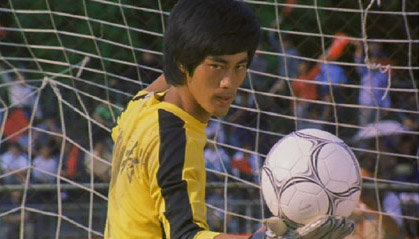
The Pitch: Stephen Chow wants to promote the benefits of kung fu for everyday use: you know, parking your car, trimming your hedges, helping to not wipe out when you slip on a banana peel. He meets a coach who wants to get revenge on his nemesis, the manager of Team Evil. Harnessing the power of kung fu, they form team Shaolin Soccer and join the tournament to defeat the bad guys.
How It Plays: Pretty awesome. It's like the secret love child of the best martial arts movies, the best Looney Tunes cartoons and the World Cup Finals. Or something. There's also a bunch of broad humor that's kind of hit-or-miss, but I could watch the matches for hours. Once team Shaolin gets their mojo back, they can literally fly through the air while flipping to either head the ball or bicycle it into the back of the net, more often than not knocking their opponents into the goal in the process. They can also kick the ball so hard that it lights on fire and burns off people's uniforms. In the final match against Team Evil (seriously, points right there for efficiency in screenwriting) players are kicking the ball so hard that it causes some kind of weird tornado/force of nature thing that is impossible to describe but nearly kills everyone on the pitch. It's that kind of movie.
Quality of Football on Display: Well, it's awesome, but as noted above, not exactly realistic.
The Result: Impossibly charming. It's like a friendly match between two clubs where everyone plays well and a good time is had by all.
My left wing... Kicking and Screaming
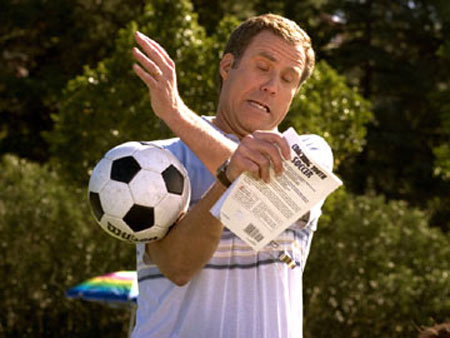
The Pitch: Will Ferrell plays Will Ferrell and Robert Duvall plays his father, a man so obsessed with winning that he kicks his own grandson off the soccer team he coaches. Ferrell then becomes coach of his son's new team, The Tigers, who are godawful. So Ferrell enlists the help of his father's next door neighbor and arch-nemesis, Mike Ditka. Yes, that Mike Ditka. The Tigers get better, setting up an Oedipal climax of less-than-epic proportions.
How it Plays: This movie is more entertaining than it has any right to be. Duvall is actually pretty funny as the bully father who thinks his own son is kind of a wuss. And Ditka totally holds his own in his scenes with Ferrell. I did think it was weird that a film featuring Duvall as a man obsessed with victory totally ignored the opportunity for an Apocalypse Now joke, but whatever. Also the film features a very weird subplot in which Ditka is kind of obsessed with coffee, and Ferrell has never had coffee, and Ditka gets him hooked on the Brown Serpent to the point where he becomes a degenerate addict who gets into fights at coffe shops when the line is too long and keeps an espresso machine on the bench next to his players' orange slices and the whole thing plays about as bizarre as it sounds.
All of that said, let me just be clear: this is a movie made for children about two children's soccer coaches starring Will Ferrell. If that does not sound like your particular brand of muffin, don't let whatever small pleasures I'm describing above convince you to give it a shot.
Quality of Soccer on Display: You'll notice I use the term "soccer" here instead of "football." That's because the players are a bunch of eight-year-old American kids running around trying to kick the ball. They're playing soccer. It also makes this category kind of pointless.
The Result: I'll go ahead and talk to this movie like it talked to me, and tell it that it's not important whether you win or lose, but how you played the game. And you did a good job, movie. I'm proud of you.
My second defender... Fever Pitch
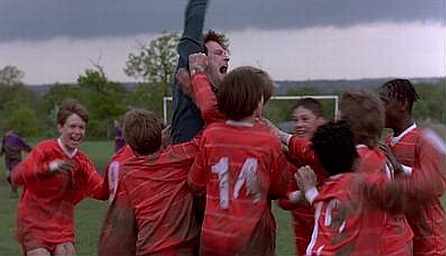
The Pitch: Colin Firth plays a fan of Arsenal in a film that charts the difficulty in trying to have a serious adult relationship while passionately supporting a professional sporting franchise. The film was adapted by Nick Hornby from his own memoir, so it's basically High Fidelity with Arsenal taking the place of a really big record collection.
How it Plays: It's pretty bland. It's like a romantic comedy that's neither funny nor romantic, and a sports movie that doesn't really have a lot of sports action. I guess what I'm saying is this movie needed Ron Shelton to come in and strike the right balance between all of its elements and make it just a little more awesome. The film has moments like a flashback scene where we see a wee Colin Firth seeing Arsenal's home pitch for the first time that should be magic, but instead are just kind of there. The one thing the movie gets right is a fan's ability to both love and hate his team, and the frequent desire to not even watch them play, because sometimes it actually isn't fun anymore. It just hurts.
Quality of Football on Display: Its mostly archival footage of Arsenal playing, so its good. Firth’s character also coaches a youth team, and his students are actually pretty good as well.
The Result: Scoreless draw.
My sweeper... Mean Machine
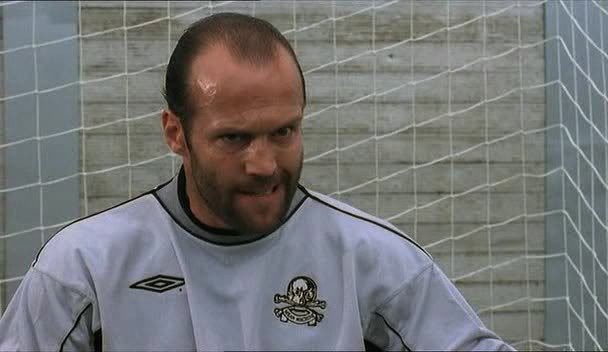
The Pitch: A remake of The Longest Yard, except instead of being about football, now its about football.
How it Plays: Pretty awesomely. Vinnie Jones plays Danny "Mean Machine" Meehan, a former captain of the England National team. At the beginning of the film, he is locked up for driving drunk and assaulting a cop. From there, well, like I said, it's a remake of The Longest Yard. And it's a pretty good one. The film also features performances from Jason Statham as "Monk," an inmate who has to be kept in solitary confinement lest he kill everyone he comes in contact with, and David Hemmings (!) as the warden with a penchant for placing terrible wagers.
Quality of Football on Display: Great. As soon as the prisoners get their team together, it's clear everyone can play and we're going to get to see some real football. The final game between the prisoners and guards is long, fun, and full of great play.
The Result: A solid win, two-nil.
My other striker... Goal! The Dream Begins
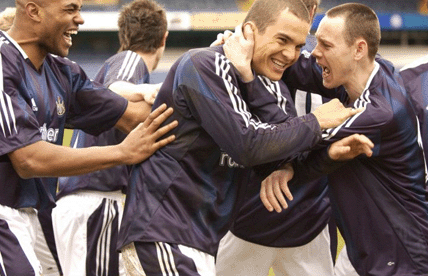
The Pitch: Santiago came to America as a young boy, crossing the border from Mexico with his family. Now grown and living in Los Angeles, he still harbors a dream of playing football professionally. Unfortunately, he is hampered by the realities of his life which include a job working with his father as a gardener and the fact that his father considers his dreams silly and unrealistic. Then, miraculously, a former scout for Newcastle United is watching a game on the next pitch over from his and happens to spot Santiago playing. Convinced the kid has a chance, he promises a tryout for Newcastle if Santiago can get himself to England. And so The Dream Begins...
How it Plays: Despite its unfortunate title, I loved this movie. (I gather the subtitle is related to the fact that the filmmakers were overly ambitious and conceived of the story as the first part in a trilogy that tracks Santiago all the way to the World Cup.) The thing the filmmakers got right was the game: they understand the love for the game, they understand the way the game works, they understand how to film football from the players' perspective...they got it all right. It feels like the filmmakers just realized that no one had ever tried to make a real movie centered around football, and they set out to remedy that fact. The story is pure fantasy (we follow Santiago from the barrio to England, where he tries out, gets onto the reserve team, and eventually becomes the new star for Newcastle United, beginning a romance with a cute British nurse along the way), but it works. The film also has something that has been missing from a lot of these films: production value. I guess the international box office was enough to convince the studio to sink some money into the project, so scenes like the tryout for Newcastle in a rain storm look appropriately awesome.
Quality of Football on Display: Like I said, they got it all right. The film has a good mix of actual players and actors, so the Newcastle squad and all of their opponents look like the real teams. Added bonus: after a victory in London, Santiago bumps into some players from Real Madrid who are in town filming a commercial, including cameos from Beckham and Zidane.
The Result: Like a come-from-behind victory in the Quarterfinals, 2-1.
My center midfielder... Zidane: A 21st Century Portrait
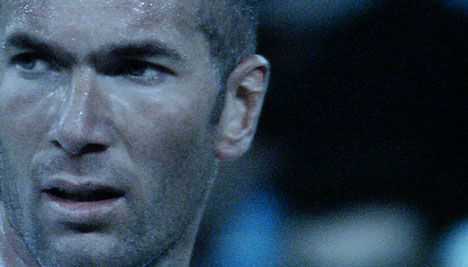
The Pitch: Over the course of a single Real Madrid match is 2005, seventeen cameras are trained on a single player, Zinedine Zidane, tracking his every movement and gesture over the course of ninety minutes.
How it Plays: This film caught me by surprise. I expected the high-concept idea to be mildly interesting, but ultimately sort of a drag. But it was riveting. Clearly, it's an experimental documentary and, as such, it's not going to be everyone's cup of tea. But it stirred me in a way only some of my favorite films do: because it's about image, and it's about movement, it's about time, and it's about space. You know...like cinema.
The film was made partly under the direction of Douglas Gordon, who seems like he exists more in the art world than the film world. Another of his recent works was 24 Hour Psycho, in which he slows down Hitchcock's film to last for a full day, so you end up watching each frame for absurdly long periods, obviously another piece interested in image and time. He hired Darius Khondji as cinematographer on Zidane, so it looks great. The advertising also highly touted the soundtrack to the film, by Mogwai, which is fine but I was much more interested in the film's non-musical sound design, which flitted between exaggerated noise from the on-pitch play to the more atmospheric, sometimes working with and sometimes working against the image.
The experience of watching the film is bizarre. You almost never have a sense of what is happening in the actual game. And Zidane only has possession of the ball for a few moments throughout the match. Certainly much less than five minutes total (although from those few moments it is clear why he is so highly regarded as a player), so a lot of the film is spent watching him move into position and watch the game unfolding on the other side of the pitch. But it is fascinating. Of all eleven films I screened here, this is the one that most feels like it understands football.
Quality of Football on Display: You spend the film watching one of the greatest players to ever play the game play an entire match in real time. So, you know, the quality is pretty high.
The Result: A towering performance. Three-nil victory.
home about contact us featured writings years in review film productions
All rights reserved The Pink Smoke © 2010